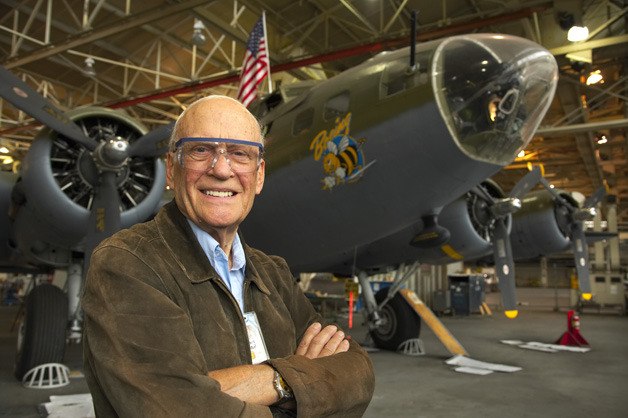One of the Boeing Co.’s longest-tenured workers has died, after a career that spanned both B-17 bombers and the 787 Dreamliner, and mastering bench lathes and robotic tools.
Al Seifert of Burien, a tool and die maker at the company’s Auburn plant, died on Feb. 20 at his daughter’s home in Snohomish. He was 91, and would have celebrated his 70th anniversary at the company this year.
According to his family, Seifert left for Boeing’s winter break in December, expecting to return to work after the holidays. But he fell ill and was diagnosed with cancer, which prevented him from returning.
Seifert started at Boeing in 1942, two months after the Japanese attack on Pearl Harbor vaulted the United States into World War II. He began by rigging controls on B-17s.
Seifert served in the U.S. Army from 1944 to 1946, receiving a Purple Heart for wounds received at the Battle of the Bulge, then returned to Boeing after the war, where he began to master the tool and die trade that he followed for the rest of his life.
Seifert developed a reputation for his ability to take a concept from paper to fully realized product, and his personal contributions resulted in three different patents granted to Boeing, for both products and processes.
“If someone was working on a special project and ran into trouble Al could always figure out how to make it,” said Dan Meddaugh, a recent Boeing retiree who worked with Seifert for the past 10 years.
“Al trained a lot of engineers who came out of school with good degrees, but didn’t have practical experience,” said Butch Loney, an electrician who worked with Seifert for nearly 25 years. “After working with Al a couple times, their drawings seemed to get better.”
Seifert spent most of his seven decades at Boeing as a Machinists Union member and is believed to be one of a “handful of workers” in the union’s history to have walked the picket line in every one of District Lodge 751’s strikes against Boeing from 1948 to 2008.
Seifert accepted a promotion into management and served as a manager for more than a decade, his family said. But eventually he chose to return “to the bench,” where his Machinists Union colleagues respected him for his common sense, mechanical precision, dry sense of humor and what loved ones called a “remarkable comb-over.”
Seifert was part of a classic Boeing family. He met his wife, Yolanda, while working at Boeing, and the two of them married in 1949. Their daughter, Lorelei, retired after a career at Boeing, and a grandson, Brett, works today on the 747-8 flight line in Everett.
“Al was usually the first one in our shop and he made coffee for the crew,” said Meddaugh. “Al loved working at Boeing. That was his hobby.”
In addition to his wife, and daughter, Lorelei, Seifert is survived by another daughter, Desiree Retallick; his son-in-law, Bill Retallick; his brother, Willard Seifert of Wahpeton, N.D.; and three grandchildren.


